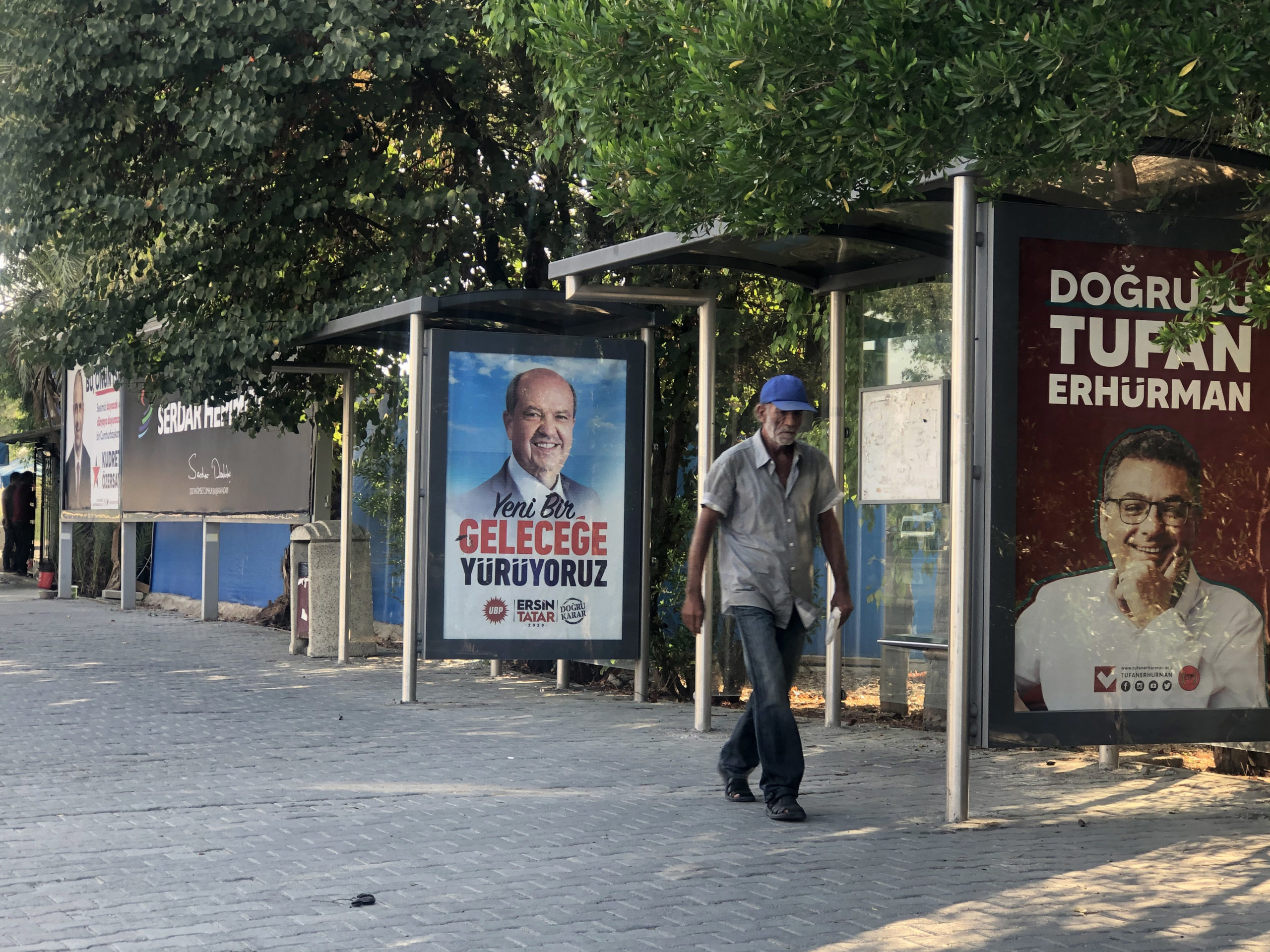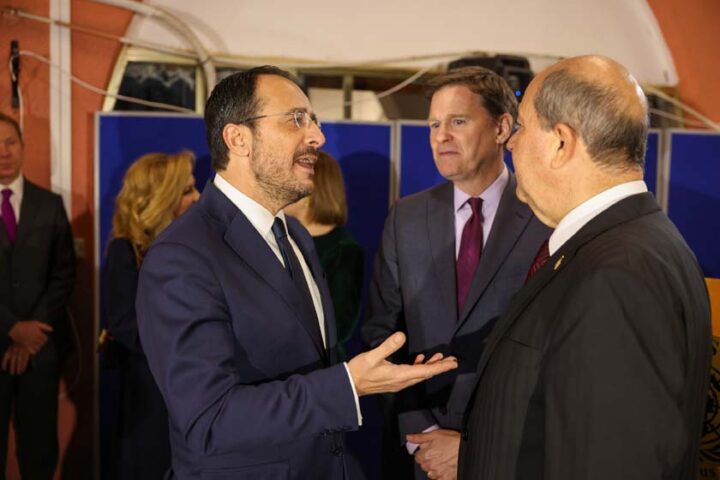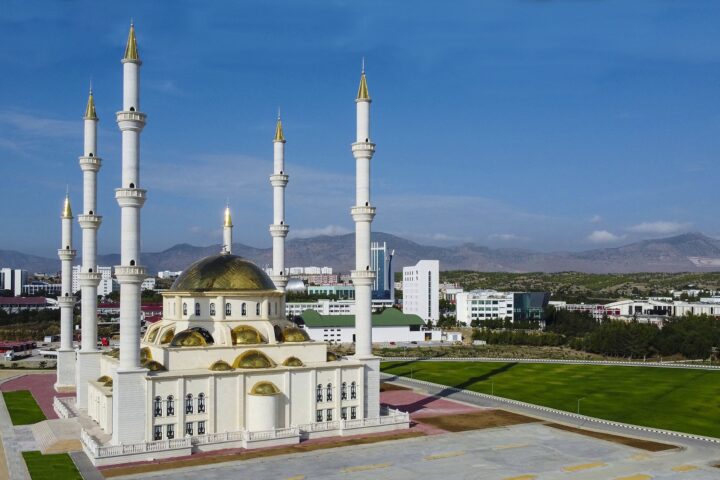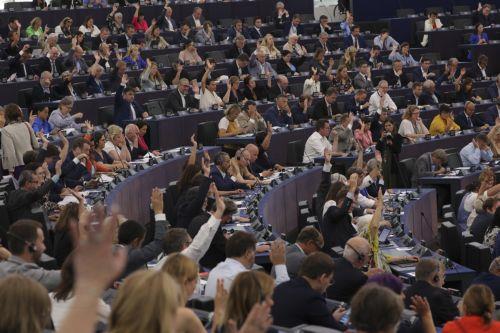October elections for a new Turkish Cypriot leader in the north may see incumbent Mustafa Akinci lose out as polls show him trailing the current head of the ruling coalition Ersin Tatar.
Turkish Cypriot and Greek Cypriot analysts see this vote as probably as crucial for the future of the Cyprus peace process, but candidates are preoccupied over relations with Ankara.
Apart from the run-off on 11 October for the leadership, this time around the elections seen as a referendum on what ties with Turkey should look like, say analysts.
Mustafa Akinci, who according to analysts has been clear in his stance against Turkey’s meddling, is currently in a tight spot as he may have a hard time passing to the next round.
A poll held by Turkish Cypriot daily Kibris Postasi has right-wing coalition leader Tatar first on 25.88%, Akinci just squeezes through to the second round past left-wing Tufan Erhurman with 24.27%.
They are followed by Serdar Denktash, former leader of the Democratic Party (DP) with 8.18% and the ruling coalition’s second-in-command Kudret Ozersay and leader of the People’s Party (HP) with 6.95%.
Some 5,000 participated in the online survey which was carried out 15-21 September.
The poll did not ask participants to reveal their intentions in the second round.
The latest opinion poll carried by Turkish company Gezici has Akinci going through to the second round with Tatar but loses out 45.9% to Tatar’s 54.1% in the run-off.
Talking to the Financial Mirror, Ahmet Sozen Professor of Politics at the Eastern Mediterranean University in Famagusta said the elections will be a sort of referendum on what kind of solution Turkish Cypriots favour.
The result will also reflect the kind of relationship the community wants to have with Ankara, whether it is one of mutual respect or one where it will be doing its bidding without question.
“The Turkish Cypriots are going to the polls to elect their chief negotiator for the Cyprus problem, essentially giving the go-ahead to the policy that candidate represents,” Sozen argued.
He said that while everyone values having good relations with Turkey, not all have the same starting point as Akinci.
CTP’s leader Tufan Erhurman has a rather vague approach while others will toe-the-line on Turkey’s foreign policies like far-right candidate Erhan Arikli.
“At the moment Mustafa Akinci clearly represents the strive for a bizonal and bicommunal federal solution to the Cyprus problem, which breaks away from Ankara’s foreign policy.
His track record has been consistent with the parameters endorsed by the two sides in the 1970s.”
Akinci is seen as a politician who has developed left-wing policies not always in line with Turkey.
He is known for his head-on confrontation with Turkish President Recep Tayyip Erdogan.
Sozen expects to see Akinci increasingly gaining points from his stance towards Turkey.
Akinci is threatened by the right-wing leader Tatar and Erhurman of the left-wing CTP.
Tartar’s UBP party in the Turkish occupied north is traditionally reactionary when it comes to the Cyprus problem with much of the party openly supporting a two-state solution.
He is tipped to come out on top in the first round of the elections.
“The former negotiator Kudret Ozersay and his HP do not totally reject the idea of a federation but have said time after time that other options should be on the table”.
Ozersay is seen as Ankara’s chosen one by many Turkish Cypriots due to his close ties with the Turkey Foreign Minister Mevlut Cavusoglu and other state officials.
“These ties, coupled with his inconsistency in his declarations and policies, have cost him to lose a large number of supporters in the north,” argued Sozen.
Voter apathy
Low turnout in the elections will be a factor in the outcome.
“The last election saw just 63% turnout in the first round and 66% in the second. There is disillusion among Turkish Cypriots who have lost hope for a Cyprus solution.
If these people along with some boycotters turn towards pro-solution candidates, then Akinci and Erhurman have a greater chance of being elected.”
Turkish Cypriot journalist and political analyst Esra Aygin sees the vote as determining the future of the north.
“At a time when Ankara’s meddling in the north is at its peak, the community needs someone to stand up for its rights.
Even in the case that no solution is found, the community needs someone to stand up and say that we are not willing to bow to Turkey,” said Aygin.
She said there are two polarized camps among voters.
“In the one camp, you have those who feel threatened by Turkey’s interference in their lives, and those who believe that we need to be on good terms with Ankara to continue to exist.”
“Tufan Erhurman during his 15-month tenure as leader of the ruling coalition did not refer to a solution with the fear of upsetting Turkey, he also took pride in never crossing to the south while he was head of the administration in the north”.
She said the discussion on the community’s ties with Ankara is key for the future of peace talks and Cypriots openly fighting in the interest of peace and against the “Turkification” of the north.
Erhurman backs a Cyprus solution based on a bicommunal federation, however, what differentiates him from Akinci is that he believes if the Greek Cypriots are not ready, then Turkish Cypriots should go at it alone.
Nikos Moudouros, University of Cyprus lecturer in Turkish and Middle Eastern Studies, told the Financial Mirror said this election campaign has a different backdrop.
“Not just because of COVID-19, which does not allow for the traditional rallies with candidates taking to social media, but because this is the first time that the issue of relations with Turkey is put so clearly on the agenda.”
Moudouros said the issue was always on the agenda, but in a more covert manner as it was coded through positions regarding the Cyprus problem.
“People supporting a federal solution, covertly conveyed messages of going against Turkey’s foreign policies and those who supported a different solution such as two states, were covertly supporting Ankara’s policy on the Cyprus problem and the region.”
Many Turkish Cypriots acknowledge that relations with Turkey are problematic and a threat to their existence.
A possible victory for those who oppose Turkey’s plans to impose its will can effect stalled Cyprus peace talks.
“A victory for those arguing that Turkish Cypriots should make do with their own resources, be it financial, or on issues like water supplies, will inevitably change relations with the Greek Cypriot side, enhancing cooperation.
This would in turn shape the geopolitical identity of the island and its role in the region,” said Moudouros.










